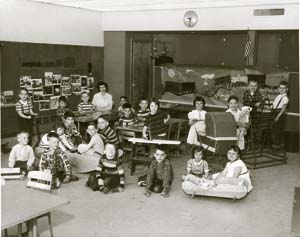 |
 |
| current issue |  |
past issues |  |
send a letter/news |  |
address update |  |
advertise |  |
about us |  |
alumni home |
Features
MissilewomanPage 2 of 3
As the program director for Aegis Ballistic Missile Defense, Paige is the grand overseer of a project that involves thousands of people across the Missile Defense Agency, the Defense Department, the Civil Service, military contractors, the Navy fleet and other countries. Her role, broadly defined, is to make sure everyone knows precisely what the goals are and to see to it that they have what they need to reach those goals.
 In this Kindergarten photo, Paige [center] poses with a toy
iron and ironing board. It's the "closest she has ever gotten
to a real iron," says her mother.
In this Kindergarten photo, Paige [center] poses with a toy
iron and ironing board. It's the "closest she has ever gotten
to a real iron," says her mother.
|
"I spend lots of time communicating with people to review, assess, facilitate, counsel, critique, conspire and negotiate," Paige explains, "all towards some combination of keeping the mission priorities understood, executed thoroughly and well, and taking care of the people who make it happen."
Paige has spent a good portion of this particular morning in a meeting discussing a cooperative agreement with Japan to share Aegis and PAC-3 technology as a way to begin building a global missile defense system. The rest of her day was taken up by a meeting with her boss (a three-star Air Force general), a CIA briefing on classified operations, a technical briefing on satellite infrared capabilities and a phone call from a young Navy officer seeking her counsel. In between, she finalized arrangements for moving her office, effective the following day.
When she isn't traveling, Paige usually arrives home, the place she reserves for doing nothing, around 8 p.m. Husband David Tuma, a retired Navy captain who used to operate submarines, makes her dinner. He also pays the bills, picks up the dry cleaning and takes care of all the other mundane tasks that Paige (who takes her last name from a previous marriage) is just too busy to bother with. "I am," she acknowledges, "a very spoiled person."
Her grandmother would be proud. A self-assured woman who distinguished herself during World War I as a chief yeomanette, Mary Tobin never cared for the mechanics of running a house. "Don't get married, Kate," she warned her granddaughter. "You'll just have to lug in groceries."

|
The qualities that served her grandmother so well--self-assurance, intelligence, refinement, a relentless work ethic--emerged in Paige at an early age. In fact, to hear her mother tell it, Kate was the model child growing up with her older brother and younger twin sisters in the tiny town of Scotia, N.Y. Her mother remembers she was obedient, helpful, calm, easy to get along with, dependable. "Just solid," says Toby Koehler.
Paige made the same impression on Donald Murray '48, now professor emeritus of English, when she took one of his courses while at UNH. Though he doesn't remember much about her reporting skills, he does remember that she so stood out among her peers that he handpicked her to babysit his daughters. "My daughters tell me now," he adds, "that she was the only babysitter whom they obeyed instantly."
In addition to journalism, Paige also studied theater at college. Her mother thought it a waste of time, but Paige says she was "attracted to the idea of learning by doing. It was so different than anything I'd ever done." Not surprisingly, perhaps, what Paige enjoyed most about the theater was directing.
After she graduated in 1970, however, she was exasperated to find that a liberal arts degree only seemed to qualify her for low-paying clerical jobs. Paige began to consider a stint in the military. The Kent State shootings still hung over the country, though, and her final weeks before graduation had been marked by mass anti-war demonstrations that halted some classes and threatened to shut down the campus.
Page: < Prev 1 2 3 Next >Easy to print version

